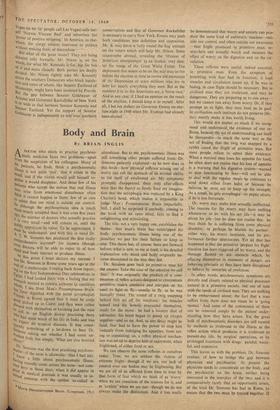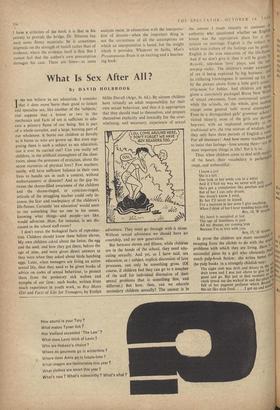Body and Brain
By BRIAN INGLIS ADOCTOR who elects to practise psychoso- matic medicine faces two problems—apart from the scepticism of his colleagues. Many of his Patients, he finds, think a psychosomatic Illness is not quite 'real'; that it exists in the mind, and if the victim would pull himself to- gether it would disappear. And those few of his Patients who accept the notion that real illness May arise from emotional disturbance often to it cannot happen to them; few of us care to admit that our mind is outside our control. So although the psychosomatic idea is much more widely accepted than it was even five years go, the number of doctors who actually practise II is very small—and will remain so, until the tublie appreciate its value. To be appreciated, it must be understood; and with this in mind Dr. A "r. W. Simeons has produced the first really `13n)Prehensive account* for laymen (though even doctors will be able to enjoy it) of how mind and body interact to produce illness. At this point I must declare my interest. get Simeons in Rome some years ago at the• end of a stethoscope. Coming back from report-, eg on the first independence Day celebrations in Egypt I had landed there with a feeling that my si °n. lach wanted to remain airborne (a condition which, I see from Man's Presumptuous Brain, has been dignified with the name aerophogha rends in Rome agreed that it must be some germ Picked up in Cairo: and they were rather vu'eaSed with themselves at knOwing just the man wt. call in--an English doctor practising there 417 had spent much of his life in India and was gu expert on tropical diseases. It was conse- s entlY something of a let-down to hear Dr. :aeons asking not whether I had eaten un- hed fruit, but simply, 'What are you worried about?'
tor. Simeons was the first practising psychoso- 4,t_ist—if the term is allowable—that I had met. :cuing a little about psychosomatic illness, recently come across the term—not corn- 137i n here in those days; when it did appear in verntt in medical journals it was usually in in- ed Commas with the epithet 'so-called' in m AN, s PRESUMPTUOUS BRAIN. (Longmans, 25s.) attendance. But to me, psychosomatic illness was still something other people suffered from. Dr. Simeons patiently explained—as he now does in this book—how physical reflexes arising out of worry can rob the stomach of its normal ability to rid itself of swallowed air. My symptoms promptly disappeared; their only after-affects were that the theory so firmly fired my imagina- tion that the acrophagia was replaced by a King Charles's head, which makes it impossible to judge Man's Presumptuous Brain impartially. Still, I shall be surprised if anybody, coming to the book with an open mind, fails to find it enlightening and stimulating.
The title, not a very happy one, establishes the theme: that man's brain has outstripped his body, psychosomatic illness being one of the penalties we pay for their failure to keep in step. This thesis has, of course, been put forward before: what is new, to me at least, is his detailed explanation why mind and body originally be- came dissociated in the Way they did.
Dr. Simeons goes back lei primitive man for • the answer. Take the case of the emotion we call 'fear.' It was originally the product of a com- bination of reflex actions.deSigned to concentrate primitive man's attention and energies on his need to fight or fly—usually to fly. as he was basically timid. The sound of a twig snapping behind him set off the reactions: his muscles tensed and his bowels evacuated themselves, ready for the move : he had a booster shot of adrenalin; his heart began to pump up oxygen supplies—and so on. And, as any delay might be fatal, fear had to have the power to stop him instantly from indulging his appetites, from eat- ing or copulating; so, a reflex phySical mechan- ism was set up to deprive him of enjoyment, when frightened, of either food or sex.
We can observe the same reflexes in ourselves today. True, we are seldom the victims of extreme fright—though if we are, our lack of control over our bodies may be frightening. But we are all of us afflicted from time to time by that form of fear which we think of as 'worry' when we are conscious of the reasons for it, and as 'anxiety' when we are not—though we do not always make the distinction. And it tan easily be demonstrated that worry and anxiety can pro- duce the same kind of automatic reaction—out. side our control, and often outside our awareness —that fright produced in primitive man; re- searchers can actually watch and measure the effect of worry on the digestion and on the cir- culation.
These reflexes were useful, indeed essential, to primitive man. Even the symptom of trembling with fear had its function; it kept muscles and circulation tuned up, if he was in hiding, in case flight should be necessary. But in civilised man they are irrelevant, and may be dangerous. They are preparing us to run away— but we cannot run away from worry. Or, if they prompt us , to fight, they may land us in gaol. In civilisation such instincts do not preserve life: they merely make it less worth living.
This would not matter so much if we recog- nised and understood the existence of our re- flexes, because the act of understanding can itself be therapeutic—in much the same way as the act of finding that the twig was snapped by a rabbit cured the fright of primitive man. But most people refuse to admit their existence. When a worried man loses his appetite for food, he often does not realise that his loss of appetite is a warning that his digestive system—warned to stop functioning by fear—will not be able to deal with the regular meals he continues to send down either from habit or because he believes he must eat to keep up his strength. As a result, he gets aerophagia—or peptic ulcers, if he is less fortunate.
Or, worry may make him sexually ineffectual. The reasons for the worry may have nothing whatsoever to do with his sex life—it may be about his job—but he does not realise this: he may think he is suffering from some physical disability, or perhaps he blames his partner: either way, his worry increases, and his per- formance further deteriorates. Yet all that has happened is that the primitive 'prepare for flight' .reaction has been triggered off by worry, and the message flashed to sex instincts which, by effacing themselves in moments of danger, are behaving precisely as they have been disciplined to behave by centuries of _evolution.
In other words, psychosomatic symptoms are directly and closely related to physical processes natural in a primitive society, but out of tune with the needs of civilised man. They are nothing to be embarrassed about; the fact that a man suffers from them does not mean he is 'going mental.' And some of the commonest of them can be removed simply by the patient under- standing how they have arisen. Yet the great bulk of psychosomatic disorders are still treated by methods as irrelevant to the illness as the reflex action which produces it is irrelevant to present-day life, by surgical operations, or by prolonged treatment with drugs: painful, waste- ful, and expensive.
This leaves us with the problem, Dr. Simeons realises, of how to bridge the gap between physician and psychiatrist. At present the physician tends to concentrate on the body, and the psychiatrist on the brain, neither being interested in the interplay of the two; and it is comparatively rarely that an opportunity arises, of the kind Dr. Simeons has had in Rome, to ensure that the two must be treated together. If I have a criticism of the book it is that in his anxiety to provide the bridge, Dr. Simeons has used some flimsy materials; he is sometimes dogmatic on the strength of hunch rather than of evidence, where the evidence itself is thin. But I cannot feel that the author's own presumption damages his case. There are times—as some analysts insist, in connection with the interpreta- tion of dreams—when the important thing is not the correctness of all the assumptions on which an interpretation is based, but the insight which it provides. Whatever its faults, Man's Presumptuous Brain is an exciting and a hearten- ing book.







































 Previous page
Previous page